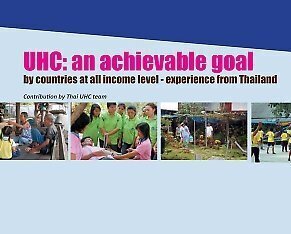
Policy brief:
UHC: an achievable goal by countries at all income level – experience from Thailand
Contribution by Thai UHC team
Based on a decade experiences of universal health coverage in Thailand between 2001-2011; a few key policy messages emerge for global audiences.
UHC as a national agenda to reduce poverty
- UHC requires the strong commitment from politicians, civil society and technocrats. UHC has to be a National Agenda.
- UHC is a concrete measure in reducing poverty in addition to access to healthcare and improving health (figure 1).
Figure 1 Cumulative number of households prevented from medical impoverishment
- Countries do not have to be rich to achieve UHC. Thailand started to cover the poor when the GNI per capita was merely $US 400 in 1975 and achieved UHC at less than US$ 2000 in 2002 (figure 2). Achieving UHC is not a ‘one shot’ decision but a gradual add on processes.
Figure 2 Thailand’s pathway towards Universal Health Coverage against GNI per capita, 1970-2010
How to mobilize additional resources for health?
a. A policy commitment in shifting investment from urban secondary and tertiary care to rural primary health care infrastructure
b. Increase the size of fiscal space for health by maintaining internal peace and security, and stimulate economic growth---which frees the budget from expenditure on national security and public debt servicing to invest in health and social sectors (figure 3).
Figure 3 Proportion of Thai government budget allocated to health, education, national security and debt servicing 1969-2003

c. Innovative health financing: in 2010 sin-taxed based Thai Health Promotion Foundation mobilized more than 100 million USD per year for health promotion and community development fund mobilized more than 150 million USD for community development activities
What are the ingredients for a successful UHC?
- Extensive geographical coverage of healthcare infrastructures with adequate health staff especially at primary health care level, government bonding and rural mandatory health services by health professional launched since 1972.
- Adequate institutional capacity and experiences in managing pre-paid healthcare financing systems.
- Capacity in health policy and systems research in generating knowledge and evidence and translate them into policy decisions on health system reform.
Good systems designs matter
- In countries with a huge size of informal economy, general tax revenue is the most pragmatic sources of finance UHC and also the most progressive where the rich pays higher proportion of their income on tax than the poor.
- A fixed budget and a cap on provider payment approaches are considered the best options to control cost, improved efficiency and ensure the long term financial sustainability.
- The application of contract model with clear separate role and responsibility of Health Insurance Management Unit and healthcare providers network ensure accountability and responsiveness to UCS beneficiaries.
- Comprehensive benefit package covering outpatient, inpatient, accident and emergency, prevention and health promotion, and high cost services without co-payment prevents catastrophic expenditure.
Good system designs determine significant achievements
- The UCS improved health equity on various dimensions
- Equity in financial contribution: tax finance scheme is the most progressive where the rich pays higher proportion of their income on tax than the poor.
- Equity in health services utilization: empirical evidence showed a pro-poor of utilization of outpatient services and hospitalisation in particular at health centres, district and provincial MOPH hospitals.
- Equity in government health subsidies: government subsidies for health services (net of household payments) benefited disproportionately more to the poorer than the richer.
- Improving access to health services and reducing unmet-need. It was found that in 2010 among those who were asked of necessary use of health services during the last 12 months, 1.44% and 0.4% had unmet-need for OP and IP respectively. This low level is on par with high performing OECD countries.
- Efficiency improvement: although government expenditure on UCS between 2001 and 2011 increased substantially as a results of increased utilization and cost of production but its impact on total health expenditure as percent of GDP is less evident as UCS reduced household direct payment and the underlying trend of steady growth of Thai GDP.
Remaining challenges and solutions
- Conflict resolution between the National Security Office as a purchaser and healthcare providers, both public and private. There are a number of models which have been proposed such as commissioning by area based health authorities which needs further investigation.
- Harmonization of three public health insurance schemes by standardization of benefit package, provider payment methods and level of government subsidies, and dataset used for scheme administration
- Management of funds and delivery systems:
- focus more on disease prevention and health promotion services
- effective primary care gate-keeping system
- development of community and home-based long term care with effective interface with clinical service to respond to rapid ageing society
- critically assess new interventions and medicines based on evidence of cost-effectiveness, long-term budget impact and other ethical concerns prior to inclusion in the benefit package
- Move towards more geographical equity in human resource allocation through strong ministerial leadership and evidence-informed policies to improve strategic purchasing.
- Further strengthen the UCS governing bodies by making them more representative, transparent, and socially accountable; and most important, by managing and preventing conflicts of interests among governing body members.








